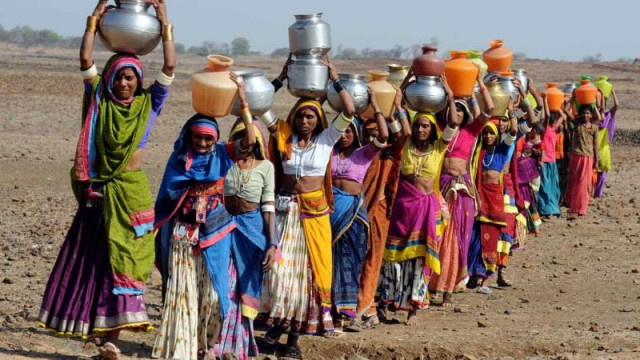Climate policy key to mitigating health risks for vulnerable
Marginalised communities bearing the brunt of adverse fallouts of climate change

Experts have highlighted the profound challenges faced by vulnerable communities in the wake of climate change-induced natural disasters, suggesting comprehensive policies to mitigate the impact, especially on women and the poor.
Communities, particularly those already marginalised, are bearing the brunt of events such as droughts and floods, exacerbating health risks like undernutrition and malaria.
Talking to APP on Sunday, experts emphasised the intricate relationship between human health and environmental hazards, emphasising the urgent need for comprehensive strategies to address these issues.
For many impoverished populations, adapting to climate change is not a choice but a bitter reality.
Research indicates that the poor, especially in developing nations, are disproportionately affected by climate variability and change.
Experts in various findings have examined the myriad ways in which climate change adaptation policies and strategies are developed, and they systematically discuss the factors which either facilitate or hamper the involvement of all stakeholders in the development of these intervention measures.
Our findings indicate that women seem to be the group of people who are mostly unaware of community initiatives, policies, and strategies for adaptation to climate change.
Various studies recommend that to achieve successful public participation in climate change adaptation policy development, there must be an all-inclusive system which incorporates all stakeholders, including vulnerable groups.
However, mainstreaming women-focused resilience-building measures into policymaking is key to lowering their exposure to the adverse fallouts of climate change, particularly floods, Ministry of Climate Change and Environmental Coordination spokesperson Muhammad Saleem Shaikh told APP.
He said that building climate resilience in marginalized communities, especially women, by engaging them in climate policymaking and policy implementation processes as well as enhancing investment in women-focused climate risk management programs and actions is an important ingredient in building the climate resilience of women.
The ministry spokesperson highlighted that various studies show that when communities or women are not fully engaged in climate work, programmes are likely to meet with failure, by putting them at greater risk of increased exposure to climate change impacts.
Rapid industrialisation
Talking to APP noted environmentalist Mahmood Khalid Qamar opined that technological advances in agriculture and rapid industrialisation have considerably polluted the two pillars of natural resources, i.e. land, and water.
Toxic chemicals and microbial contaminants/agents created by natural and anthropogenic activities are rapidly becoming environmental hazards (EH) with increased potential to affect the natural environment and human health.
Noted pulmonologist Dr Zeeshan from Jinnah Hospital Lahore says the environment has serious effects on our health in a variety of ways, by significantly impacting human health in two ways, either directly by exposing people to harmful carbon agents or indirectly, by disrupting life-sustaining ecosystems.
Therefore, it is imperative to consider huge poor populations in policymaking as a top priority.
The World Health Organisation (WHO) in its recent report has given its estimation that thirteen million deaths annually are attributable to preventable environmental causes.
Women bearing heavier brunt
The report also estimates that 24 per cent of the global disease burden (healthy life per year loss) and 23 per cent of all deaths i.e. premature mortality among these communities particularly women are attributable to environmental factors, with the environmental burden of diseases, that means 15 times higher in developing countries than in developed countries.
This occurs due to differences in exposure to environmental risks and non-availability of access to health care amid environmental reasons.
The report further says that five children in developing countries every minute die from malaria or diarrhoea.
UN reports further say half of the world’s poor and ignored population was comprised of women and child girls, yet they remained mostly out of the conversation when it came to building the climate resilience of the communities.
According to UN reports, women and girls formulate nearly half of the agricultural labour force in less developed countries including Pakistan.
When provided with the same access to resources as men, women can increase their agricultural yields by 20 to 30 per cent. This boost in productivity, not only improves total agricultural output by 2.5 to 4 per cent, but it can also help reduce world hunger by 12 to 17 per cent.
Another pulmonologist and critical care physician, Dr Muhammad Ahmad said that dramatic occurrences of rising Asthma cases and undernutrition including malnutrition throughout the global cities were increasing at an alarming level.
He said that various environmental synthesis reports are giving precautionary warnings that further erosion of ecosystems could lead to a rise in existing diseases such as malaria and cholera, as well as a rising risk of new emerging viral diseases in the world.
Therefore, thickly populated areas should be at the top agenda and must be included in policy-making.
In response to a query, Ahmad said that safe drinking or bathing water in megacities can impose serious risks (both acute and delayed) to human health, adding microbe contamination of groundwater due to arsenic-rich levels and high concentrations of poisonous nutrients in sewage waters due to agricultural runoff are among the most serious threats.
With accelerating frequency and intensity and without communities’ policy drafting, severe storms, heatwaves, wildfires, droughts and other extreme weather events are having ever-more evident impacts on human health and wellbeing.
Meanwhile, it is worth mentioning here that recently Secretary of the Ministry of Climate Change (MoCC) & Environmental Coordination Ezaz A. Dar assured the ambassador of the Republic of Azerbaijan to the Islamic Republic of Pakistan Khazar Farhadov to extend all-out support for the successful organisation, conduct and negotiations at the two-week long UN-led 29th session of the Conference of the Parties set to kick off from November 11 this year at Baku.



















COMMENTS
Comments are moderated and generally will be posted if they are on-topic and not abusive.
For more information, please see our Comments FAQ